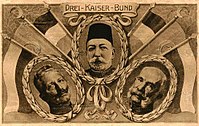Central Powers
The Central Powers, also known as the Central Empires,[1][notes 1] were one of the two main coalitions that fought in World War I (1914–1918). It consisted of the German Empire, Austria-Hungary, the Ottoman Empire, and Bulgaria; this was also known as the Quadruple Alliance.[2][notes 2]
For the World War II alliance, see Axis powers.
Central Powers
The Central Powers' origin was the alliance of Germany and Austria-Hungary in 1879. Despite having nominally joined the Triple Alliance before, Italy did not take part in World War I on the side of the Central Powers. The Ottoman Empire and Bulgaria did not join until after World War I had begun. The Central Powers faced, and were defeated by, the Allied Powers, which themselves had formed around the Triple Entente.
Bulgaria signed an armistice with the Allies on 29 September 1918, following a successful Allied advance in Macedonia. The Ottoman Empire followed suit on 30 October 1918 in the face of British and Arab gains in Palestine and Syria. Austria and Hungary concluded ceasefires separately during the first week of November following the disintegration of the Habsburg Empire and the Italian offensive at Vittorio Veneto; Germany signed the armistice ending the war on the morning of 11 November 1918 after the Hundred Days Offensive, and a succession of advances by New Zealand, Australian, Canadian, Belgian, British, French and US forces in north-eastern France and Belgium. There was no unified treaty ending the war; the Central Powers were dealt with in separate treaties.[35]



